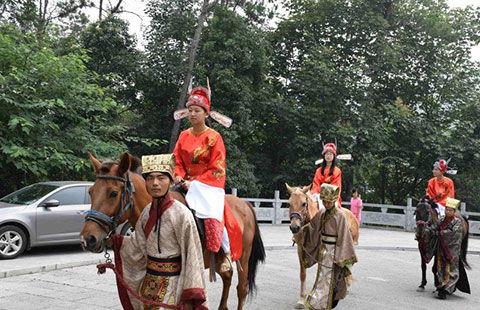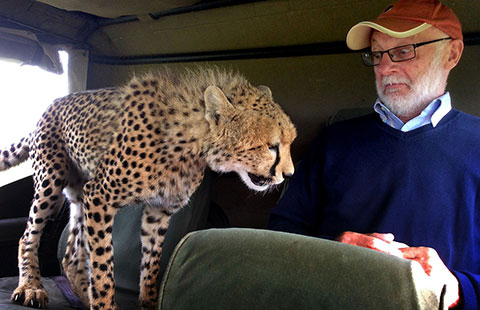Buy more Brazilian beef: ex-consul
Updated: 2015-07-13 04:12
By Yang Ziman in Beijing(China Daily)
|
||||||||
China needs to import more meat from Brazil, especially beef, to cater to the growing domestic demand, said an ex-consul of Chinese embassy to Brazil.
“Brazil’s meat, especially beef, is delicious and healthy. It is in the interest of Chinese consumers to have more Brazilian meat import as the Chinese middle class has higher requirements on the quality of meat,” said Wang Yuanqing, who after 13 years of service has just retired from his post as a business consul at the Chinese embassy in Brazil. He delivered the comment on July 2 during a discussion focused on introducing business opportunities to Brazil.
China ended a three-year-old embargo on Brazilian beef imports, Brazils agriculture ministry said on July 7, imposed because of the mad cow disease epidemic that hit Brazil in 2012.
Eight Brazilian beef processing plants and one poultry plant have been approved to ship to China, the Brazilian agriculture ministry said. The ban was lifted after Brazilian President Dilma Rousseff and Chinese Premier Li Keqiang signed trade, finance and investment deals worth tens of billions of dollars during Premier Li’s visit to Latin America from May 18 to 26.
According to the Brazilian agricultural ministry, altogether 26 factories will receive warrant from the Chinese government to export meat to China, representing $520 million in potential sales volume to China.
Brazil is the largest beef exporter in the world. China is Brazil’s largest trade partner.
“Brazilian barbecue restaurants are immensely popular in China,” said Wang. “It’s a pity that these restaurants were not able to use authentic Brazilian beef due to the import embargo. Now that the ban has been lifted, Chinese consumers can enjoy authentic Brazilian barbecue.”
Chen Yejun, general manager of Fa Fa Import and Export, a food import and export company based in Rio de Janeiro, said that her company used to focus on importing Chinese food to Brazil. As Brazil’s meat export to China has been put back on track, her company is thinking about hopping on the bandwagon to sell Brazilian meat to Chinese consumers.
“We are going to focus on beef and chicken feet export,” said Chen. “Brazil has world-renowned beef famous for its tenderness. As for chicken feet, since it is a common snack food in China but not in Brazil, we believe that the market is going to be quite large.”
According to a report released in 2014 by Grand View Research Inc, a global consultancy company, Asia-Pacific is expected to be the largest regional market for beef in the next few years. Its beef revenue exceeded $580 billion in 2013. Growing disposable income in China coupled with high preference for red meat is expected to be a key driver for the market over the forecast period.
China has huge demand for imported beef because of the inadequate home supply, according to professionals in the industry.
“The beef industry in China is still in the primary stage,” said Gao Guan, deputy secretary-general of the Chinese Meat Association. “Cattle farms scatter around throughout the country with very low scale of economy. The production cycle is long and costly, deterring people from going into cattle-related business. In recent years, around 2 million tons of beef and mutton in China fall short of supply every year. The wide gap between high demand and inadequate domestic supply has resulted in the increasing reliance on imported beef.”
According to statistics, from 2000 to 2013, China’s annual beef output increased from 5.1 million tons to 6.7 million tons, up 31.2 percent.
“As people’s requirement on the food quality rises, they want to have higher quality beef and mutton in the future, not just larger quantity,” said Gao.
Jian Aihua, researcher of food industry at Shenzhen-based China Investment Consulting Corp, said that there is a great potential for China’s beef consumption
“Chinese people’s per capita consumption of beef is 4 to 5 kilos every year, only one-fifth of global average. Beef prices keep rising. It’s quite normal that beef exporters want to sell their product to China.”
China has strict regulation on imported beef, Jian added. Before the lift on banned beef imports from Brazil, there were only six countries that exported beef to China. Three of them – Uruguay, Argentina and Costa Rica – are in Latin America, and two are Oceania countries – Australia and New Zealand.
The demand for beef has given rise to smuggling. In 2013, China’s domestic beef output stood at 6.4 million tons. Its legal import was 297,000 tons. However, the actual frozen meat transaction neared 9 million tons. Two million tons of beef was unaccounted for.
The Netherlands-based Rabobank published a report in 2014 that noted that China has to raise beef imports by 20 percent every year in the next five years to meet the domestic demand.
In September 2013, the Chinese government launched a national beef industry auxiliary plan to increase beef output, hoping that by 2015 beef output will reach 7.17 million tons, and 7.86 million tons in 2020. At the moment, the annual output is only 6.3 million tons.
“The government’s plan seems unable to curb the appetite for imported beef,” said Chenjun Pan, an analyst at Rabobank.“Chinese beef industry is difficult to grow even with the government’s support. Its beef output will grow slowly, but not so fast as to catch up with the increase of demand. The gap will make China’s beef import grow at 20 percent annually in the next five years.”
yangziman@chinadaily.com.cn

 Top gaokao scholars saddle up for a ride in the park
Top gaokao scholars saddle up for a ride in the park
 Girl who shoots straight with bow and arrow
Girl who shoots straight with bow and arrow
 Ten photos you don't wanna miss - July 10
Ten photos you don't wanna miss - July 10
 Forum Trends: Should we pay children to study?
Forum Trends: Should we pay children to study?
 Bereaved seniors turn attention to grandchildren
Bereaved seniors turn attention to grandchildren
 Unusual but true: sleep in a transparent glass room clinging to cliff
Unusual but true: sleep in a transparent glass room clinging to cliff
 24-year-old ethnic Chinese girl runs for US Congress
24-year-old ethnic Chinese girl runs for US Congress
 Plane makes emergency landing after fire
Plane makes emergency landing after fire
Most Viewed
Editor's Picks

|

|

|

|

|

|
Today's Top News
Leaders agree on partnership blueprint
New Development Bank launched in Ufa
IMF keeps 6.8% China growth view
Leaders agree on partnership blueprint
More tariffs on Chinese solar panels
Students study depression to raise suicide awareness
Official denial raises doubts over '40-year-old meat' story
Yuan hit by turmoil in the market
US Weekly

|

|






